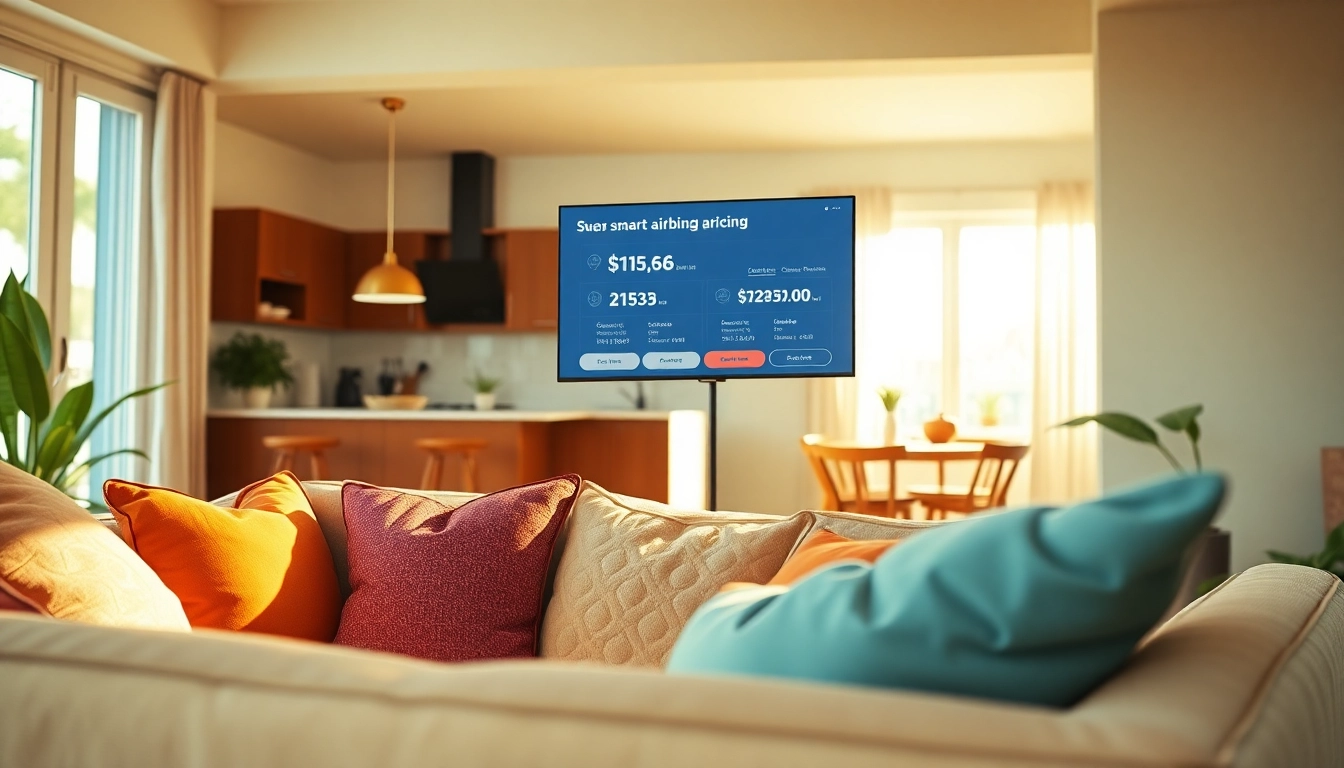Understanding Smart Airbnb Pricing
As the short-term rental market becomes increasingly competitive, hosts are constantly searching for ways to maximize their revenue. One of the most effective strategies is implementing smart Airbnb pricing, which uses data-driven approaches to optimize pricing based on various factors. This comprehensive guide will delve into the intricacies of smart pricing strategies, explore market trends, and provide actionable insights for Airbnb hosts aiming to enhance their profitability.
What is Smart Airbnb Pricing?
Smart Airbnb pricing refers to the use of advanced pricing techniques that integrate market data, competitor analysis, demand forecasts, and booking patterns to determine optimal price points for short-term rentals. Unlike traditional pricing methods that often rely on set rates, smart pricing strategies adjust dynamically to provide optimal rates that attract bookings while maximizing revenue.
By analyzing various factors such as seasonality, local events, and occupancy rates, smart pricing allows hosts to position their listings competitively and respond to market fluctuations in real-time. This approach not only helps in improving occupancy rates but also in enhancing guest satisfaction by offering value through competitive pricing.
Benefits of Implementing Smart Airbnb Pricing
- Increased Revenue: Implementing smart pricing strategies can significantly boost revenue by capturing higher rates during peak demand periods while remaining competitive during off-peak times.
- Improved Occupancy Rates: Flexibly adjusting prices based on market trends ensures that listings remain attractive to potential guests, thereby improving occupancy rates.
- Data-Driven Decision Making: Hosts can make informed decisions based on comprehensive data analysis rather than relying on intuition, leading to more effective pricing strategies.
- Time Efficiency: Automated pricing tools save hosts time by continuously monitoring market conditions and adjusting prices accordingly, allowing them to focus on other aspects of their rental business.
Key Features of Effective Pricing Strategies
To take full advantage of smart Airbnb pricing, hosts should consider the following key features:
- Dynamic Pricing: Constantly adjusts rates based on real-time market conditions, ensuring prices are competitive.
- Market Analytics: Analyzes local market data, including competitor pricing and occupancy rates, to inform pricing decisions.
- Seasonality Adjustments: Accounts for seasonal changes in demand, allowing hosts to optimize pricing during peak and off-peak periods.
- Integrated Technology: Utilizes pricing tools and software that integrate with listing platforms, streamlining the pricing process.
Market Analysis for Smart Airbnb Pricing
Understanding the broader market context in which you operate is crucial for setting effective smart Airbnb pricing. This section will focus on identifying market trends, performing competitive analysis, and assessing target audience demand.
Identifying Market Trends
Market trends influence guest behavior significantly. To effectively implement smart pricing, hosts must stay informed about:
- Travel Trends: Recognizing shifts in vacation destinations, travel preferences, and booking patterns can guide pricing strategies.
- Local Events: Major local events such as festivals, concerts, and conventions can create spikes in demand. Understanding the calendar of such events allows hosts to price their listings accordingly.
- Economic Factors: Economic conditions, including employment rates and consumer confidence levels, can affect travel spending and, consequently, pricing strategies.
Competitive Analysis Insights
A comprehensive competitive analysis is essential for understanding how to position your pricing. Consider the following:
- Identifying Competitors: Utilize platforms to find similar listings in your area to analyze their pricing strategies and occupancy levels.
- Benchmarking: Compare your pricing against competitors to identify opportunities for adjustment and differentiation. Understanding the amenities and features that competitors offer can also inform your pricing decisions.
- Reviews and Ratings: Assessing competitors’ feedback can help identify strengths and weaknesses, allowing you to position your pricing based on perceived value.
Target Audience and Demand Assessment
To fine-tune your pricing strategy, consider the demographics of your target audience:
- Understanding Guest Preferences: Analyze data to understand what amenities or features drive bookings for your target audience.
- Seasonal Demand Patterns: Assess how demand varies by season and adjust pricing accordingly to capture peak demand periods.
- Market Segmentation: Segmenting your audience based on traveler types (leisure, business, etc.) can help tailor your offerings and pricing to better meet their needs.
Best Practices for Smart Airbnb Pricing
To effectively implement smart Airbnb pricing, consider these best practices that will guide your pricing strategy for optimal results.
Setting Competitive Pricing Based on Data
Data-driven pricing relies heavily on accurate market insights. To set competitive pricing:
- Leverage Pricing Tools: Use technology solutions that provide market insights and pricing recommendations based on a wide array of data, from local events to competitor pricing.
- Historical Data Analysis: Review historical occupancy rates and pricing data to identify trends and establish a baseline for future pricing adjustments.
- A/B Testing: Experiment with different pricing strategies to find the optimal balance between occupancy rates and revenue per booking.
Seasonality and Pricing Adjustments
Seasonality plays a crucial role in rental pricing.
- Forecast Seasonal Changes: Understand how demand fluctuates throughout the year and adapt your pricing strategy accordingly.
- Advance Booking Discounts: Offering discounts for advanced bookings can help secure early revenue and mitigate risks during slower periods.
- Last-Minute Pricing: Consider implementing last-minute pricing strategies to maximize occupancy rates as the check-in date approaches.
Utilizing Technology for Real-time Pricing
Harnessing technology can significantly improve pricing effectiveness.
- Dynamic Pricing Algorithms: Utilize algorithms that analyze competitor pricing, demand fluctuations, and other vital metrics to optimize rates in real time.
- Pricing Software Integration: Select a pricing tool that integrates seamlessly with your property management system to facilitate quick adjustments.
- Data Visualization Tools: Use dashboards that provide easy-to-read visuals of market trends and pricing performance, allowing for quick decision-making.
Case Studies on Smart Airbnb Pricing
Examining case studies provides insights into real-world applications of smart Airbnb pricing, showcasing both successful implementations and learning opportunities.
Successful Implementations in Various Markets
Several hosts have successfully implemented smart pricing strategies. For instance:
- Urban vs. Rural Analysis: Hosts in urban markets often utilize dynamic pricing due to higher demand from tourists, adjusting rates based on local events and occupancy rates.
- Resort Locations: In resort areas, hosts can leverage seasonality, increasing rates during peak holiday periods while offering competitive pricing in the off-season.
- Localized Demand Insights: Hosts who analyze and respond to localized market conditions—such as price adjustments during major events—see improved occupancy and revenue.
Lessons Learned from Pricing Failures
Not every strategy will yield positive results. Learning from failures provides valuable insights:
- Overpricing Risks: Some hosts learned the hard way that overpricing can lead to prolonged vacancies, significantly impacting overall revenue.
- Insufficient Market Research: Failing to conduct adequate market research before pricing adjustments can lead to suboptimal pricing strategies that do not account for local demand.
- Ignoring Competitor Movements: Hosts that overlook competitor pricing changes may miss profitable opportunities to attract guests.
Analyzing Performance Metrics
Continual performance analysis allows hosts to refine their pricing strategies:
- Revenue per Available Room (RevPAR): This key performance indicator measures how much revenue each room generates and helps to gauge pricing effectiveness.
- Occupancy Rate Tracking: Monitoring the occupancy rate and adjusting strategies based on trends can directly impact revenue.
- Guest Feedback Analysis: Evaluating guest reviews and feedback can provide insights into whether price adjustments align with perceived guest value.
Future Trends in Smart Airbnb Pricing
As the vacation rental landscape continues to evolve, staying ahead of the curve will be crucial for hosts. This final section will explore emerging trends that are shaping the future of smart Airbnb pricing.
The Role of AI and Machine Learning
Artificial intelligence (AI) and machine learning are transforming pricing strategies:
- Predictive Analytics: AI technologies analyze vast datasets to forecast demand and suggest optimal pricing, dramatically improving decision-making processes.
- Automated Adjustments: Machine learning models can adjust pricing based on guest behavior and market patterns in real-time, ensuring frequent optimization without manual intervention.
- Enhanced Personalization: AI can tailor offers based on traveler preferences, leading to targeted pricing strategies aimed at specific segments.
Impacts of Regulatory Changes
As short-term rentals frequently face changing regulations, staying informed is critical for hosts:
- Compliance Implications: Regulatory changes can affect pricing strategies, requiring hosts to adapt pricing based on new compliance costs or restrictions.
- Adaptive Strategies: Understanding local regulations can inform decisions regarding pricing limits and operational models.
- Community Engagement: Engaging with local communities can provide hosts insights into potential regulatory shifts impacting their pricing strategies.
Building Resilience in Pricing Strategies
Strong pricing strategies are adaptable and resilient:
- Scenario Planning: Hosts should develop pricing strategies that can adapt to various market conditions, ensuring resilience in the face of disruption.
- Diverse Revenue Streams: Diversifying offerings can help mitigate risks associated with market fluctuations, allowing hosts to adjust pricing in response to shifting demand.
- Continuous Learning: Embrace a culture of continuous learning and adaptation to refine pricing strategies and stay competitive in the evolving market.



